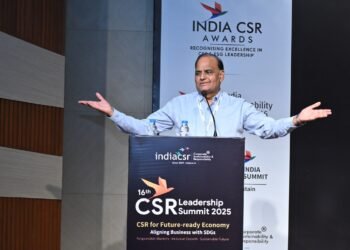NEW DELHI (India CSR): In this exclusive interview, we speak with Priya Agarwal Hebbar, the Non-executive Director of Vedanta Limited. She provides insights into Vedanta’s commitment to corporate social responsibility, sustainability, and the crucial role the company plays in helping India achieve its ambitious climate and environmental goals. From net-zero ambitions to employee engagement in sustainability initiatives, Priya Agarwal Hebbar offers a comprehensive look at how one of India’s leading diversified natural resources companies is paving the way for a greener, more sustainable future.
Vedanta’s Net Zero Ambition and India’s Climate Goals
Q1: How is Vedanta planning to achieve its net zero goals and will help India achieve its net-zero goal 2070?
Agarwal Hebbar: At Vedanta, our ESG goals are intricately woven into our overall business strategy, with emphasis on transforming communities, the planet, and the workplace. We are committed to reducing our carbon emissions to net zero by 2050 or even sooner. These targets help us navigate the road towards contributing to India’s net-zero ambitions for 2070. We’re investing in new technologies, transitioning to renewable energy sources, and constantly innovating our processes to meet these goals.
Energy Transition: Industry Perspective and Vedanta’s Green Initiatives
Q2: Could you elaborate on the industry outlook on Energy transition and how Vedanta is taking steps towards a greener future?
Agarwal Hebbar: Industry-wide, there is a palpable shift towards understanding the risks of climate change and transitioning to greener energy solutions. Vedanta is at the forefront of this transition. We’re actively involved in producing essential metals for renewable technologies like electric vehicles and solar panels.
Our efforts have already yielded significant results:
We’ve reduced our greenhouse gas intensity by 30% from FY21.
Our use of renewable energy has increased 14 times since FY20.
We’ve planted nearly one million trees as part of our commitment to plant 7 million trees by 2030.
We’ve reduced our net freshwater consumption by more than 10%, despite the majority of our plants being located in water-stressed areas.
Sustainable and Green Operations at Vedanta: Projects and Initiatives
Q3: How has Vedanta adopted practices to make its operations sustainable and green?
Priya Agarwal Hebbar: We’re making strategic investments, to the tune of USD 5 billion over the next decade, to make our operations more sustainable. From introducing low carbon metals like Restora and Restora Ultra to adopting green copper lines, we’re pushing the envelope in sustainable business practices. By 2030, we aim to generate 2.5 GW of continuously operating renewable energy capacity.
Fostering Employee Engagement in Sustainability: Vedanta’s Approach
Q4: How is Vedanta engaging its employees in the company’s sustainability initiatives?
Priya Agarwal Hebbar: Employee engagement is a crucial element in realizing our sustainability goals. After all, it is the collective effort of our team that will make these goals achievable. We have several internal programs designed to educate and involve our staff in our sustainability journey.
For example, we’ve introduced an innovative, market-leading Electric Vehicle (EV) policy to encourage our employees to transition to EVs. Since the policy’s rollout, more than 50 EVs have been purchased across the company. We’re also planning to completely decarbonize our fleet of light motor vehicles by 2030, involving our employees in the process by helping them understand the significance of this transition.
We also engage our employees in community outreach and environmental initiatives like tree planting drives. Our employees play an active role in helping us achieve our commitment to plant 7 million trees by 2030.
Towards a Water-Positive Future: Vedanta’s Steps and Timelines
Q5: What measures is Vedanta taking to become a ‘water positive’ organisation?
Priya Agarwal Hebbar: We are actively working on water recycling and rainwater harvesting. Vedanta recycled 77 billion liters of water in FY23, and we aim to achieve 100% water positivity by 2030.
Q6: Has Vedanta set any specific timelines for achieving its water-positive goal?
Priya Agarwal Hebbar: By 2030, we will achieve 100% water positivity. Short-term, we’re targeting a 15% reduction of fresh-water consumption by 2025.
Reducing Greenhouse Gas Emissions: Practices by Companies Like Vedanta
Q7: In what ways are companies like Vedanta reducing greenhouse gas emissions?
Agarwal Hebbar: We have a four-pronged strategy: Increase the share of renewable energy. Switch to low-carbon fuels. Improve overall energy efficiency. Purchase carbon offsets for hard-to-abate emissions.
We’re incentivizing our staff to transition to electric vehicles (EVs) and have committed to completely decarbonize our fleet of light motor vehicles by 2030. By 2030, we aim to reduce our GHG emissions by 25% against a baseline of FY21 emissions.
(Copy Right @ India CSR)






















